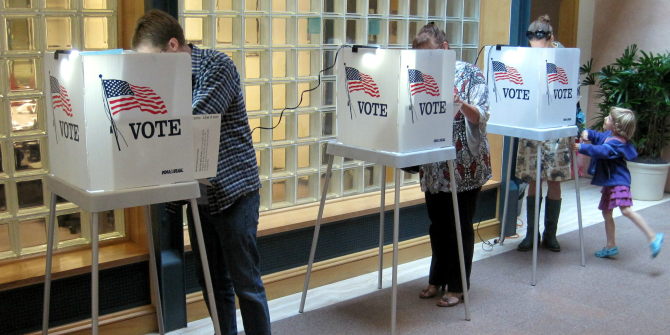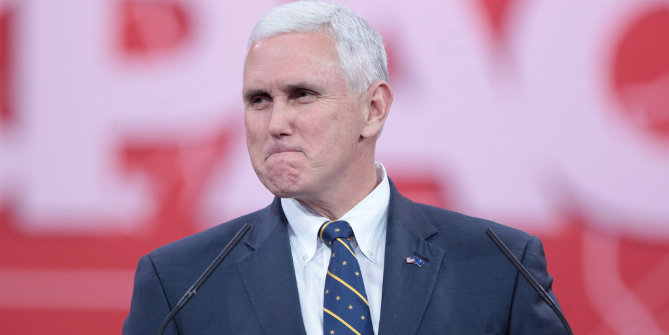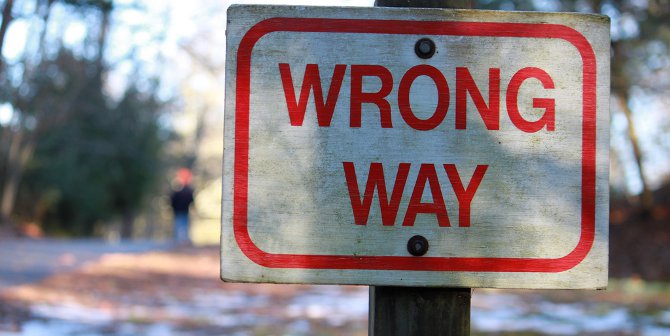 This week, Donald Trump announced that Indiana Governor Mike Pence would be his Vice Presidential pick. Aaron Dusso takes a close look at Pence’s selection, writing that the Governor is a relatively standard Republican who has low name recognition and hails from a non-battleground state. In the end, he says, Vice Presidential picks do not matter a great deal in general elections; the choice may matter even less this year given the top of the ticket’s larger than life persona.
This week, Donald Trump announced that Indiana Governor Mike Pence would be his Vice Presidential pick. Aaron Dusso takes a close look at Pence’s selection, writing that the Governor is a relatively standard Republican who has low name recognition and hails from a non-battleground state. In the end, he says, Vice Presidential picks do not matter a great deal in general elections; the choice may matter even less this year given the top of the ticket’s larger than life persona.
Whenever discussing a vice-presidential pick I feel compelled to preface any statement I make with the fact that research in Political Science has not found the VP pick to be all that important, with some small exceptions. The VP might help gain some votes in their home state and intense media focus on the VP could cause some voters to take the VP into consideration when voting for president. VP picks are not game changers and Donald Trump’s choice of Indiana Governor Mike Pence won’t be either. Furthermore, most predictions have Trump winning Indiana easily. Thus, if Trump needs the few points that Pence brings with him on Election Day to hold Indiana, it is going to be a very good night for Clinton.
Prior to becoming governor of Indiana, Pence served in the US House of Representatives from 2001 to 2013. By the time he left office, he was consistently ranked as one of the most conservative members of the Republican caucus. In his short time as Governor he has cut taxes, expanded the school voucher program and the number of charter schools, investigated Planned Parenthood, and fought to keep Syrian refugees out of Indiana. Pence also leads with his religious faith. These conservative credentials likely played a big role in driving Trump’s decision to choose Pence. Pence is a pretty standard Republican and his presence may help to soothe the anxieties of Republicans who have yet to get on board with the Trump candidacy. In the end, high profile Republicans from battleground states were not lining up to be on the ticket. Thus, Pence is likely the best choice Trump could have made.
The problem that Pence brings with him is that he has very little name recognition around the county. A McClatchy-Marist Poll from early July has 68 percent of respondents indicating that they were unsure or never heard of Pence. To the extent that anyone has heard of him, it is likely from the massive media spotlight that shone on him and the state after passing Indiana’s version of the Religious Freedom Restoration Act. This did not go well for Pence or the Republican led state legislators as they scrambled to make post-hoc changes to the law. The same McClatchy-Marist polls found 21 percent of respondents to have an unfavorable opinion of the Indiana Governor. Indeed, Pence once had aspirations of running for president himself this cycle. Those died with his signing of the law. Prior to joining Trump’s ticket, Pence was running for reelection here in Indiana and recent polls had shown considerable narrowing of his lead over Democratic challenger John Gregg, who Pence beat rather easily last time.
The reality is that Pence may have been eager to join the Trump ticket in order to avoid a tough reelection campaign and the potential of a humiliating loss. This would likely have ended his political career in Indiana. A loss as a VP candidate would not do that. He can still come back in two years and challenge Democratic Senator Joe Donnelly. This would likely be a particularly good year for Republicans in general since it would be an off-year election with a Democrat sitting in the White House, which always bodes well for the opposite party. Thus, I would guess that Pence’s political calculations are that in two years he will either be vice-president or running a very winnable campaign for senator.

The other problem that Pence brings to the ticket is that he is a pretty generic, “establishment” Republican and the Trump brand has been anti-Republican establishment for over a year. There also appear to be some major policy disagreements between them. To date, Trump has roundly criticized free trade agreements saying that he would break NAFTA. Historically, Republicans have been strongly supportive of these agreements and Pence had a solid record of support for free trade while in the House. However, the word “historically” is an important part of that last sentence, since recently the GOP platform committee has changed its tune and now agrees with Trump’s criticism of free trade. My guess is this is just a bump in the road and in the post-Trump world, the Republican Party will return to its free trade roots. Pence was also a strong supporter of the Iraq War, which Trump supported and then opposed. Pence tweeted that calls to ban Muslims were offensive and unconstitutional. Pence will, no doubt, publically fall in line with Trump’s policy positions, but the differences are there if one chooses to look.
In the end, it is important to remember that the VP pick does not matter very much. I think that this choice will matter even less this year when the top of the ticket is the larger-than-life personality of Donald Trump. I find it hard to believe that there will be more than a handful of voters that will enter the voting booth this November and say to themselves, “I’m not really a fan of Donald Trump, but that Mike Pence is a great guy, so I’m supporting the Trump/Pence ticket.”
Finally, as someone who lives about a mile from the capital building here in Indianapolis, ever since the RFRA fiasco, the city has seen “Pence Must Go” signs popping up in yards and windows all over town. Interestingly, once these signs have gone up, they tend to stay up for a long time. My guess is that none of the people placing these signs thought their wish would be fulfilled by having Pence become Donald Trump’s VP pick.
Featured image credit: Governor Mike Pence of Indiana Credit: Gage Skidmore (Flickr, CC-BY-SA-2.0)
Please read our comments policy before commenting.
Note: This article gives the views of the author, and not the position of USAPP – American Politics and Policy, nor the London School of Economics.
Shortened URL for this post: http://bit.ly/29WZD6B
_________________________________
 Aaron Dusso – Indiana University-Purdue University Indianapolis
Aaron Dusso – Indiana University-Purdue University Indianapolis
Aaron Dusso is an Assistant Professor in the Department of Political Science at Indiana University-Purdue University Indianapolis and a core faculty member of Indiana University’s Center for Civic Literacy. His primary research is on the intersection of political psychology and citizen knowledge and engagement. He is currently finishing a book manuscript on the Big Five personality traits’ effect on citizens’ capacity to understand abstract notions like ideology; know basic facts about important political issues; ability to connect their personal policy preferences to the political party that best represents those interests; and likelihood of holding hypocritical policy preferences where they benefit from “submerged” or “hidden” welfare programs like home mortgage interest tax deductions, while opposing visible programs like food stamps.





